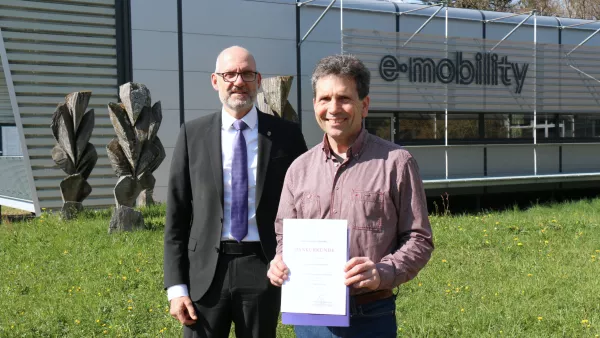
Rector Professor Dr. Thomas Spägele has honored Professor Dr. Andreas Siggelkow for his 25 years of public service. He presented him with a certificate of thanks from the state of Baden-Württemberg.
Andreas Siggelkow joined RWU in 2008 as Professor of Electrical Engineering. In the following years, he held numerous positions in his faculty. He headed the Bachelor's degree program in Electrical Engineering and the associated teacher training program, and later also the new degree program in Electromobility and Renewable Energies. He was Vice Dean for seven years and a member of the RWU Senate.
A big step: internationalization.
The decision to internationalize was a major step not only for the faculty, but for the entire university. Andreas Siggelkow was also involved in this from the very beginning. "The idea of an English-language Bachelor's degree in Electrical Engineering was born in 2008. And even though there were initial difficulties, it became a successful model," says Andreas Siggelkow. So successful, in fact, that he was invited to many other universities in the state to report on how internationalization was achieved in Weingarten.
Andreas Siggelkow studied electrical engineering at the Technical University of Karlsruhe, now the KIT. From there he went to Hewlett Packard in Böblingen and finally to the Institute for Microelectronics, then to Siemens and Siemens Semiconductors eventually became Infineon. The common denominator in Andreas Siggelkow's case: chip development. "It was completely new to automate chip development with software tools. I'm enthusiastic about it and I'm still working on it today," says Andreas Siggelkow.
"I don't know yet whether it will be a success, but we're going to build it."
However, he came to the university for the teaching. And so he also found it a great enrichment when he handed over his administrative functions at the university a few years ago and was able to concentrate on working with students again. "I have time to read books again. And above all, I'm building a RISC-V processor with my Master's students." The University of California at Berkley has developed this chip and made all the data for it open source online.
He will reach retirement age in 2029, says Siggelkow. What will happen then remains to be seen. But until then, he is getting stuck into his work with his students. And there is another topic: "In the 90s, the big question was who would win the race, the hardware or the software. The software did it," says Andreas Siggelkow. "But we are still working on hardware neural networks. Because hardware is always faster! I don't know yet whether it will be a success, but we're going to build it." Andreas Siggelkow hasn't completely written off this battle yet.